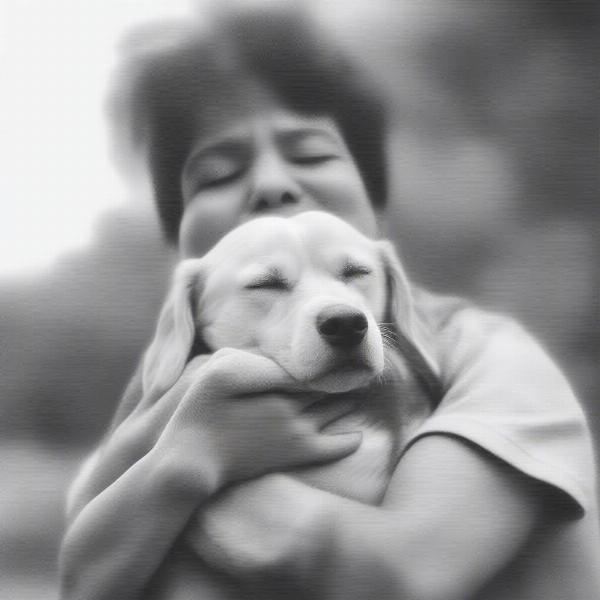Anthropomorphizing dogs, or attributing human qualities to them, is a common practice among dog owners. While our love for our furry companions often leads us to see them as little humans in fur coats, it’s crucial to understand the implications of anthropomorphism on canine well-being and the human-canine bond. This article will delve into the psychology behind anthropomorphizing dogs, its potential benefits and drawbacks, and how to strike a balance between appreciating their unique canine nature and nurturing a healthy, fulfilling relationship.
 Dog Hugging Owner
Dog Hugging Owner
Why Do We Anthropomorphize Our Dogs?
Our tendency to anthropomorphize dogs stems from a deep-seated desire for connection and companionship. Dogs, with their expressive eyes, wagging tails, and playful antics, often trigger our innate nurturing instincts. We interpret their behaviors through a human lens, attributing emotions and intentions that may not accurately reflect their canine experience. This can be influenced by our own personalities, cultural backgrounds, and the individual dog’s behavior. For instance, a dog nudging your hand might be interpreted as a sign of affection, while it could simply be a request for attention or food.
The Benefits and Drawbacks of Anthropomorphism
Anthropomorphizing dogs can have both positive and negative consequences. On the one hand, it can strengthen the human-canine bond. Seeing our dogs as family members with complex emotions motivates us to provide them with the best possible care, enrichment, and training. This perspective can foster empathy and understanding, leading to more responsible and compassionate dog ownership. However, excessive anthropomorphism can lead to misinterpretations of canine behavior, resulting in frustration, anxiety, and even behavioral problems in dogs. Projecting human emotions onto dogs can prevent us from recognizing and addressing their actual needs, based on their canine nature.
Finding the Balance: Appreciating Canine Nature
The key to a healthy relationship with our dogs lies in finding a balance between appreciating their unique canine nature and acknowledging our human tendency to anthropomorphize. While it’s natural to feel a deep emotional connection with our dogs, it’s important to remember that they experience the world differently than we do. Learning about canine communication, body language, and social dynamics can help us understand their behaviors from a canine perspective, avoiding misinterpretations and fostering a more effective communication. This involves recognizing their natural instincts, providing appropriate outlets for their energy, and respecting their individual personalities.
Conclusion
Anthropomorphizing dogs is a natural human inclination, driven by our love and desire for connection. While it can strengthen the human-canine bond, it’s crucial to be mindful of its potential pitfalls. By striving to understand our dogs’ true nature, we can build a stronger, more fulfilling relationship based on mutual respect and appreciation. This approach not only benefits our canine companions but also enriches our own lives through the unique joys of sharing our lives with these remarkable creatures.
FAQ
- Is it bad to anthropomorphize my dog? Not necessarily. Moderate anthropomorphism can strengthen the bond. However, excessive anthropomorphism can lead to misunderstandings and behavioral problems.
- How can I avoid anthropomorphizing my dog too much? Learn about canine communication and behavior. This will help you understand your dog’s actions from a canine perspective.
- What are some examples of common canine behaviors that are often misinterpreted? A dog jumping on you might not be expressing excitement, but rather seeking attention or displaying dominance. A dog licking your face might be a sign of appeasement, not necessarily affection.
- How can I better understand my dog’s needs? Observe their body language, provide appropriate outlets for their energy, and consult with a veterinarian or certified dog trainer.
- What are the benefits of understanding canine communication? It allows for clearer communication, strengthens the bond, and helps prevent behavioral problems.
- Can anthropomorphism affect my dog’s training? Yes, it can make training more challenging if you misinterpret your dog’s responses to commands and cues.
- How can I find a balance between anthropomorphism and respecting my dog’s canine nature? Focus on understanding your dog’s species-specific needs and communicating with them in a way they understand.
ILM Dog is a leading international dog website dedicated to providing dog owners with reliable, practical advice on all aspects of dog care and training. We offer expert guidance on breed selection, health and medical care, training and behavior, nutrition, grooming, exercise, puppy and senior dog care, traveling with dogs, and product reviews. Whether you are a new dog owner or a seasoned expert, ILM Dog is your trusted resource for all things dog-related. Contact us today for personalized advice and support: Email: [email protected], Phone: +44 20-3965-8624.